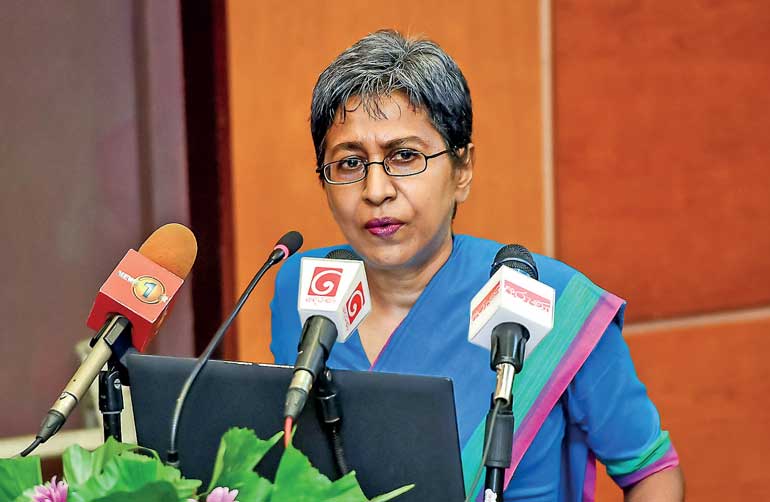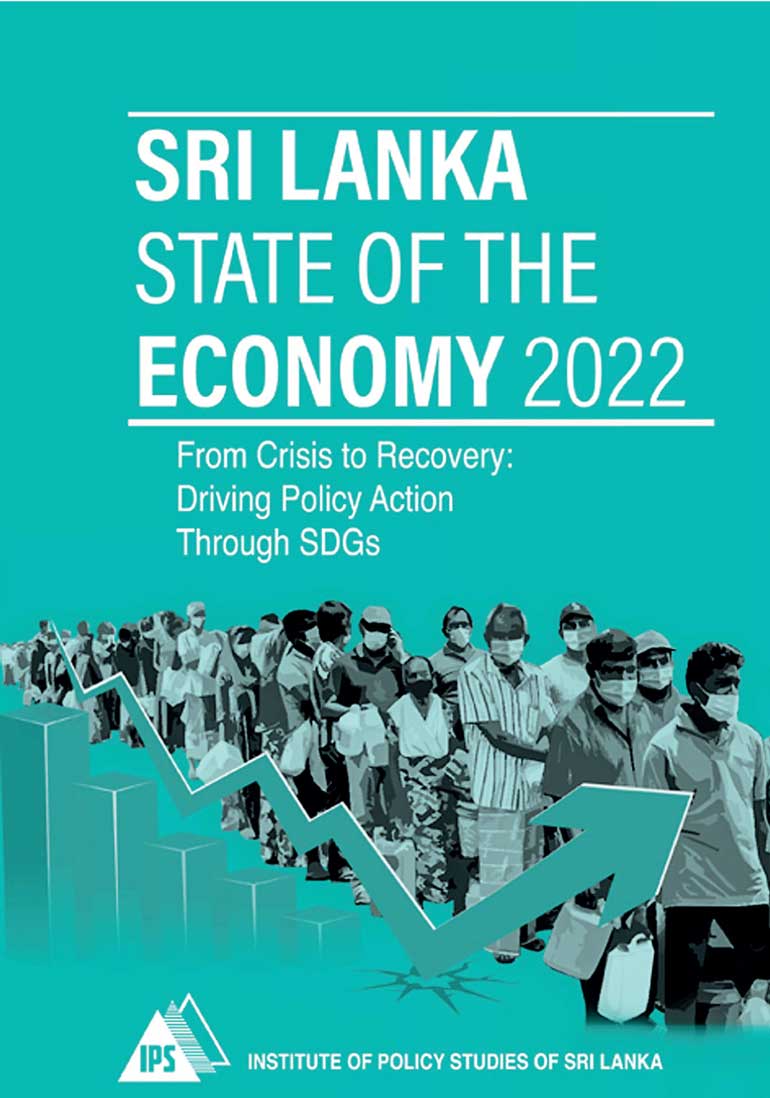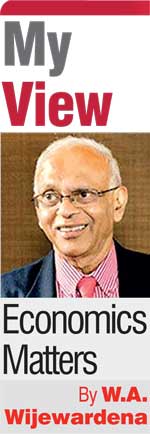Wednesday Feb 18, 2026
Wednesday Feb 18, 2026
Monday, 31 October 2022 00:20 - - {{hitsCtrl.values.hits}}

Institute of Policy Studies of Sri Lanka Executive Director Dr. Dushni Weerakoon

Economics whiz-kid Aseni and her grandfather Sarath Mahatthaya, an ex-official of the Ministry of Finance, are continuing their dialogue of the economics of Ranil Wickremesinghe, dubbed as Ranilnomics. In the previous weeks they had discussed main features of Ranilnomics and how it should be framed. Today they discuss how he should frame his long-term economic policy considering the important messages delivered by Institute of Policy Studies (IPS) in its latest report on the Sri Lanka’s State of the Economy for 2022 or SOE22.
|
Aseni: Grandpa, I have just finished reading the SOE22. I find it containing valuable analysis of the current economic issues faced by the country. But I recall you telling me that in the past none of the governments paid the due attention to its recommendations. Will the present report too have the same fate?
Sarath: IPS has been issuing this report every year since 1992. All reports have been written on a theme of importance to Sri Lanka at the time of the issue. Hence, they were current all the time. But as I have observed, previous governments did not pay due attention to them. As a result, they were just academic studies within Sri Lanka but useful source of information and analysis regarding the Sri Lanka economy for outside agencies.
Sri Lanka’s Government’s continued ignoring of the IPS report is very strange. That is because IPS was specifically setup in 1989 as an apolitical, objective, and unbiased thinktank to provide policy advice free from these defects.
The job which the public expects IPS to accomplish is in line with what the leftist Finance Minister Dr. N.M. Perera, requested from the Central Bank while addressing the senior officers of the Bank in 1971. N.M. had told them that he valued unbiased, objective and impassioned reports free from political hue. Hence, the Ranil Wickremesinghe administration should ignore this year’s SOE not only to its own peril but also to that of the whole country.
Aseni: Doesn’t the Central Bank too publish a policy report? Does it also have the same fate?
Sarath: It does but it is released somewhat later than the IPS report. The Central Bank releases it in late April of the following year, whereas IPS does it in late October in the current year before the budget so that the Ministry of Finance has sufficient time to take note of it before preparing the budget.
The Central Bank also submits a special report to the Finance Minister in September of each year to help him prepare the budget. It seems that all these reports have the same fate of being ignored by the Government. This practice is contrary to the democratic economic policy governance under which the Government should have wide consultations with all the relevant stakeholders. It often does not.
That is why we observe that policies introduced by one government agency are not in alignment with those of other agencies. This is a sure recipe for the failure of these policies.
Aseni: Let’s hope for the better that Ranil Wickremesinghe uses this report to design the necessary economic strategies to take Sri Lanka out of the current perilous state. What do you find in this report, Grandpa?
Sarath: SOE22 is subtitled as ‘From Crisis to Recovery: Driving Policy Actions through SDGs’. Here, we might not agree with IPS when it names the present state of the economy is in a crisis. For most of analysts, Sri Lanka’s economy is moribund, because it has already passed the crisis stage having gone down a bottomless abyss.
Hence, the strategy needed is to resuscitate it back to life. This is an impossible task but given the present situ, there is no alternative available. But we should accept that IPS as a professional body cannot use such harsh words to explain the situation.
The readers of the report will find three types of arguments. One relates to the diagnosis of the ailment. Another is to identify the immediate measures to be taken to take the country out of the malaise and some caveats to be avoided by the government. The third is what the Ranil Wickremesinghe administration should do to ensure long-term development of the country.
Aseni: The reasons for the country becoming bankrupt and therefore moribund are well-known to all the people now. In that context, should IPS talk about it again?
Sarath: Yes, as of now, everybody is aware of the reasons for Sri Lanka to come to this perilous state. Therefore, one might conclude that IPS has simply repeated the bad old story. There are two qualifying reasons for IPS to do so.
In a report of how Sri Lanka should strategise its economic policy program, it is necessary to describe briefly how things have gone wrong in Sri Lanka. IPS has just done that. The other qualifying reason is that IPS is a Government body and therefore courts can rely on IPS to provide an authority view. We should noy forget that there are several cases filed against those who are responsible for the suffering of the people.
IPS says that though the outbreak of COVID-19 pandemic in 2020 and 2021 caused the global economy to shrink, most of the countries were able to manage the situation by moving back to their former growth path. But Sri Lanka could not do it because of the wrong policies adopted by the previous Gotabaya Rajapaksa administration.
IPS has named these wrong policies as sharp tax cuts for promoting the economy, the Central Bank’s continued money printing to support the Government to finance the widening budget deficit, keeping the rupee value against the dollar fixed though the country lacked foreign reserves to protect the rate and allowing the foreign reserves to fall to a critically low level.
This was followed by another policy folly by seeking to convert Sri Lanka’s agriculture to organic by banning the importation of chemical fertilisers and pesticides. This has led to low food production and a progressive food shortage and increase in their prices. It says that Sri Lanka’s policies had been worsening the external shocks rather than alleviating them.
The consequences? The report puts it as follows. I quote: “An accurate tally of the avoidable policy blunders will not be known for many years, but it will be vast. The reputational damage is immeasurable; the economic cost is just beginning to be counted.”
This is a serious opinion by IPS because Sri Lanka is concerned about assigning responsibility to those who have made the country bankrupt. There are several court cases filed by private citizens against these economic crimes. Though IPS has not calculated the economic costs in the long run, there are technical methods to do so. If courts are interested, they can engage a team of professional economists to do so.
Aseni: That will be very helpful. What are the short-term recovery methods and caveats in implementing them as suggested by IPS?
Sarath: IPS has recommended that seeking a bailout package from IMF and arranging for bridge loans from ADB and the World Bank should be pursued without turning back. A precondition for these arrangements is seeking restructuring of foreign debt to ease the debt burden of the country. These are a must. But there are some caveats IPS has mentioned and they should be tackled simultaneously with other short-run programs.
IPS has drawn the attention of its readers to the marked increase in poverty and income inequality. When both these negative elements are rampant, those in the low-income categories fail to have sufficient foods to keep them in acceptable health levels. This involves issues relating to food security at the personal level.
Food security is threatened if there are shortages in the market, on the one side, and the poor are unable to buy enough food because of the sharp price increases, on the other. The poor people get hit by both, while the rich can still acquire these foods in the market by paying higher prices. But the majority belongs to this extremely swelled poor category. When their stomachs as well as those of their loved ones are empty, it will be impossible for any government to keep them under control.
IPS has given the following warning in this regard. I quote: “Poverty and inequality are on a marked rise and can undermine the broader social consensus necessary to endure a painful adjustment period unless greater sacrifices are asked from those with more ability to pay.”
Aseni: What does IPS plan to communicate with that long statement?
Sarath: If we dissect this long statement and seek to explain the tiny individual terms, we get the following big picture. Sri Lanka should introduce economic reforms to get out of the present catastrophe and set itself on a long-term growth path. But these reforms are painful and will call all people to bear the pain.
To implement reforms, there should be a common agreement among all the people. People would love to suffer the pain if its bearing is inclusive and the benefits from reforms are also inclusive. If a few categories of people escape the pain but command a higher portion of the benefits, they become an extractive institution. If these extractive institutions are promoted by the Government, the growth momentum is seriously affected forcing Sri Lankans to suffer for long.
Therefore, what Ranil Wickremesinghe administration should do is eliminating these extractive groups and make both the pain and sharing of benefits inclusive. The Government should apply laws equally without providing any preferential treatment to any particular individual or group.
Consider the recent report that some merry-seeking youngsters have invaded a protected animal sanctuary and held a cross-country car race. They have wasted the rationed fuel which is being acquired by Sri Lanka by following a hand to mouth policy. It is not something which Sri Lanka could afford given the perilous state of the economy.
If this trend continues unabated and people realise that a section of population enjoy everything including legal impunity, the consequential social discord will not only make the reforms unworking but also impel people to rise against the rulers. If Ranil Wickremesinghe administration wants to avoid it, he should apply laws equally to be seen by all.
|
Aseni: What are the features of the long-term strategy proposed by IPS?
Sarath: IPS has suggested that the actions taken to attain long-term growth should be linked to the Sustainable Development Goals or SDGs. This means that IPS is interested in achieving quality development rather than just development. There are 17 such goals pronounced by the United Nation to be realised by 2030. However, the progress so far is not very encouraging. IPS says that Sri Lanka is ranked at 87th place in the SDG Index. What it means is that Sri Lanka has paid just lip service to the realisation of SDG goals in the past.
Hence, it is timely that IPS has brought it back to the focus of the top politicians of the country who had always engaged in firefighting of day-to-day issues and not what should be done for long-term development of the country. Their focus is limited to issues like how to find dollars to pay a fuel tanker anchored in the out-harbour or ragging in universities and not beyond. This beyond part is the one which IPS has brought home today.
Now the issue is whether Sri Lanka should wait until it resolves its macroeconomic problems to start working on the long-term development plan? No, because both can be done simultaneously. This year’s SOE is the blueprint which Ranil Wickremesinghe administration should adopt to attain this goal. Out of the 16 chapters in SOE22, IPS has devoted 13 chapters to bring home its message.
Its mission has been to ensure that Sri Lanka will attain quality development in the next two and a half decades in terms of what the United Nation has prescribed in the form of SDGs. Right now, those goals have been pushed back to the backwaters, but IPS has emphasised that they should be mainstreamed by linking them to the overall development plan of the country.
What I suggest is that Ranil Wickremesinghe administration should go for a national planning secretariat staffed by professionals drawn from multi-disciplines and assign this responsibility to that secretariat with time-bound action goals. Its usual practice of setting up Cabinet Sub-Committees to steer the growth direction is good for firefighting. But what is needed today is to deliver the rich country status to Sri Lanka by the time it celebrates centenary of gaining independence from the British in 2048 as pronounced by him in his maiden address to Parliament. A unit specifically dealing with the attainment of SDGs should be an essential part of this Secretariat. Any policy proposal by a politician, Government unit, or even the private sector should first be vetted by this unit for its applicability to SDGs and if it does not, advise how to modify it to be within or compatible with those goals.
Kautilya wrote The Arthashastra in the third century BCE to educate the prospective princes of Statecraft. Even as late as the 12th century, according to the part II of the chronicle Mahavansa, titled Culavansa, King Parakramabahu I had been well versed with the Kautilyan prescription of managing an economy and the political and international affairs of a State.
Likewise, I recommend that SOE 2022 should be essential reading material for all Cabinet Ministers and State Ministers who are expected to steer Sri Lanka’s economy through these troubled waters created by their own predecessors.
Aseni: Thanks Grandpa for the expert explanation. My takeaway from this dialogue is that President Ranil Wickremesinghe who has promised to deliver the rich country status to Sri Lanka by 2048 should simultaneously tackle both the short-term macroeconomic catastrophe and long-term development initiatives.
He has no time to waste like meeting his school mates and promising them two new universities when the declared policy has been to expand the higher education through private initiatives and not by establishing more under-resourced State universities. A blueprint for the long-term growth is provided by IPS’s SOE 2022 which should be studied faithfully by all his Cabinet Ministers, State Ministers, and top advisors to bring the long-term development strategies within the ambit of UN’s SDGs.
(The writer, a former Deputy Governor of the Central Bank of Sri Lanka, can be reached at [email protected] )